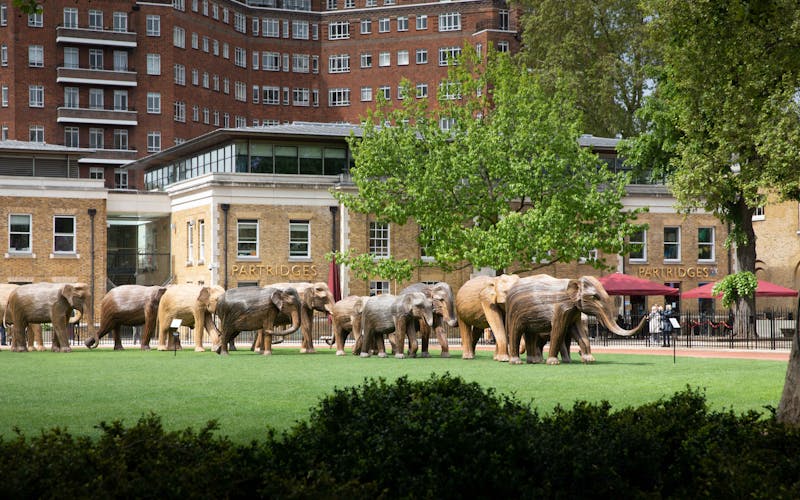

for Walpole members and
non-members available now
at The Londoner



Conservative Party Conference
Walpole’s CEO Helen Brocklebank travelled to Manchester for the recent Conservative Party Conference, attending events organised by the New West End Company and AIR - with whom Walpole collaborated on the VAT RES campaign earlier this year - on topics relevant to our sector, not least, attracting high value international visitors back to the UK, and working with Government to aid the recovery of tourism by underlining the importance of high end retail as a key part of the UK’s allure for visitors from overseas. Walpole very much supports AIR’s three main asks – improving visa access for visitors from China and the GCC, reversing the decision to abolish Tax Free Shopping (VAT RES) and extending Sunday Trading for London’s two International Districts, Knightsbridge and the West End.
The round-table sessions and receptions had good support from Ministers and MPs. It was heartening to hear that high-value tourism was integral to the government’s Tourism Recovery Plan, and also to hear Nigel Huddleston, Under Secretary of State for Sport, Heritage and Tourism at the Department for Digital, Culture, Media and Sport, underline his understanding of how crucial a role retail plays in rebuilding the tourism economy post Covid. This was reassuring, given that retail was notable by its absence from the recent DCMS Tourism Recovery Strategy.
“The message I took from my time meeting ministers and parliamentarians was broadly very reassuring: for the first time, I felt there was a distinct shift in how the British luxury sector is perceived, and most importantly, how its value to the country is understood. Paul Scully, Minister for London and Minister for Small Business, Consumers and Labour Markets in BEIS, made a particular point of stating his understanding of how high-end retail in London and other big UK cities feeds directly into skilled manufacturing and long-term sustainable jobs in the regions, and how that contributes significantly to the levelling up agenda. It was particularly encouraging to hear this, given how dismayed we had been when Treasury seemed not to be aware of the intrinsic link between luxury retail sales and regional manufacturing jobs during the VAT RES campaign.
"I was hugely encouraged by Nigel Huddleston’s acknowledgement of how much we will be competing with luxury capitals in continental Europe for those high-value international visitors, when they return in any numbers. However, he was at pains to stress that, whilst he understands the challenges of competing with Paris and Milan without VAT RES, we should be in no doubt that it would be a huge own goal if we tried to re-open discussions with Treasury without very robust data. This reinforces Walpole’s own view that we have to play a long game if we are to stand any chance of success and, as many of you will know, we have been building a strategy around this principle since the VAT RES decision came into law at the beginning of the year. In addition, there is a lot of sympathy for the challenges of labour shortages in hospitality, and acknowledgement of how business limiting a lack of staff can be, yet the government’s line that the solution lies in ‘increased pay, better working conditions’ will not change whilst the effects of furlough are still being felt, and whilst there are still 1.6 million people with the Right to Remain in the UK still staying in Europe.
"Walpole’s own research suggests that pay and conditions are good in luxury hospitality, although the competition for a small pool of staff is driving some steep rises in salaries, and most Walpole hospitality members have, even before the brexit vote, put a significant emphasis on encouraging local employment. To push for any change in government policy on access to skilled staff, we will need very robust data here too, and also to visibly demonstrate how we are encouraging local talent into local jobs. In the short term, some of this can feel frustrating, but I am confident that a strategic approach, based on a pragmatic response to the government’s position, will win through in the medium to long term.
"My other takeaway from the conference was about the very encouraging support that exists amongst parliamentarians for our sector. I spoke to Sir Geoffrey Clifton-Brown who is a long-term advocate of more agreeable visa conditions for affluent visitors from China in particular, and whose understanding of the benefits of the high-end economy is very clear, and to Felicity Buchan, MP for Kensington, whose intimate understanding of the business drivers for Walpole members in her constituency was both inspiring and impressive. This brought home to me the power of positive engagement with one’s constituency MP, and I know that you are all working hard to do all you can to develop, reinforce and enhance those strong relationships - this will stand us in extremely good stead as we go forward into the post-Covid, post-Brexit world.”
Hospitality Skill Shortages Roundtable
The British luxury sector is a major contributor to employment in the UK, employing over 156,000 people in long-term sustainable roles in all regions of the UK. However, the skills shortages that are well known amongst luxury brands have come into much sharper focus following the pandemic and Brexit, and the hospitality sector has been heavily impacted.
On the 13th of October, Walpole hosted a virtual roundtable meeting with a number of our hospitality members to discuss the issues and explore what action can be taken both with government to highlight the scale of the problem, but also to focus on possible solutions.
Ahead of the meeting we surveyed some of our hospitality members on skills shortages, the findings of which can be found here.
Overview
The luxury hospitality sector is experiencing severe problems in recruiting and retaining skilled talent particularly within the food & beverage and front of house sectors. The hospitality sector, fairly or unfairly, has a reputation for 80-hour weeks, low wages and not paying overtime. Brexit has been a key driver of the reduction in the talent pool available to the luxury hospitality sector and the pandemic has exacerbated the problem as continental staff returned home during furlough and have not returned, whereas many people on minimum wages have decided to leave the industry or have left existing roles for increased salaries elsewhere. However, this is not simply a UK problem. Recruitment in Shanghai, for instance, is also proving to be a challenge.
Staff shortages in the UK have become so severe that businesses are having to place a cap on the services they offer by limiting bookings, meaning that potential revenue cannot be realised despite consumer demand. The cost of bringing in foreign talent (including visas) is high, and not sustainable, in the long-term and is prohibitive for entry-level positions.
A further impediment to a return to growth for the hospitality and tourism sectors is the unfavourable value of the pound versus the euro which is lessening the allure of the UK over other European destinations.
With these factors in mind, we believe:
• The luxury sector must be able to demonstrate that it is taking action to solve some of the problems – including improved pay and flexibility around working hours; the provision of apprenticeship schemes; and active recruitment from new talent pools, particularly from communities which may help the Government’s levelling up agenda.
• The luxury sector would be advised to work to change the public’s perception that it is an unrewarding sector to work within with fewer career opportunities than other sectors.
Next steps
Walpole will be consulting further with members to scope a possible external campaign to enact positive change for luxury hospitality which would be both government, public and media facing.
We will update further in due course and if you would like to get in touch on this matter, please contact [email protected] in the first instance.
Corporate Affairs Working Group
We were joined for the second meeting of our Corporate Affairs Working Group by Burberry, Chanel, Estée Lauder, Harrods, LVMH and Hawthorn Advisors on the 13th of October. The meeting was used to present an overview of intelligence gathered from the Conservative Party Conference and Hawthorn Advisors' assessment of the recent ministerial reshuffle. Brand representatives gave an update on the pressing issues that are currently affecting business and their read of current issues including the fuel and supply chain crises, inflation, and skills and employee shortages.
Hawthorn Advisors presented a summary of the shared areas of concern for the sector identified during intelligence gathering meetings with members throughout the course of the past few weeks. These include: counterfeiting/IP Rights; skills and employment; VAT/tourism; the environment and the urgency of achieving Net Zero; and international trade. Walpole is building upon its current evidence base to take to Government, and working alongside Hawthorn, to maximise the level of attention given by Westminster on the impacts these challenges have on the luxury sector (both at grassroots level with constituency MPs and at ministerial level); the solutions that businesses are producing to resolve them; and the interventions that are needed by Government.
COP26
Walpole’s political engagement strategy in relation to COP26 is to demonstrate to stakeholders how the British luxury sector is driving sustainable practices and delivering on HM Government’s Goals. As part of this, Walpole will focus beyond COP26, emphasising members' roles in helping deliver the ambitious goals and objectives arising from the conference. As part of this plan, Walpole will convene a series of roundtables and activities that assist Government. This strategy fits very much within our sector’s solutions focused approach to the challenges of our times.





